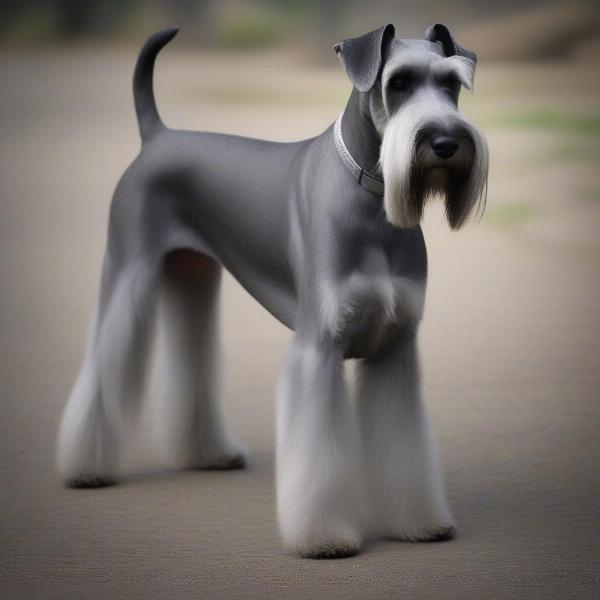Finding the best dog food for your Schnauzer can feel overwhelming with so many options available. Whether you have a Miniature, Standard, or Giant Schnauzer, their nutritional needs are unique. This guide will help you navigate the world of dog food and choose the perfect diet for your beloved Schnauzer, ensuring they live a long, healthy, and happy life.
Understanding Your Schnauzer’s Nutritional Needs
Schnauzers are prone to certain health issues like pancreatitis and bladder stones. Choosing a food that addresses these concerns is crucial. Look for foods with moderate fat content to help prevent pancreatitis. For bladder stones, consider a food formulated to maintain a healthy urinary tract pH. Regardless of size, all Schnauzers benefit from a high-quality diet with balanced protein, fats, and carbohydrates.
Key Ingredients to Look For
High-quality protein sources like chicken, lamb, fish, or beef should be the first ingredient listed. Avoid by-product meals, which are lower in nutritional value. Healthy fats like omega-3 and omega-6 fatty acids contribute to healthy skin and a shiny coat, a hallmark of the Schnauzer breed. Carbohydrates provide energy; opt for whole grains like brown rice or oatmeal rather than fillers like corn or wheat.
Best Dog Food Types for Schnauzers
- Dry Kibble: Convenient and cost-effective, kibble offers a complete and balanced diet. Choose smaller kibble sizes for Miniature Schnauzers.
- Wet Food: Higher in moisture content, wet food can be beneficial for Schnauzers prone to urinary tract issues. It can also be a good option for picky eaters.
- Raw Food Diets: While gaining popularity, raw food diets require careful preparation and monitoring to ensure nutritional balance and avoid bacterial contamination. Consult your veterinarian before starting a raw food diet.
Age-Specific Considerations
- Puppies: Schnauzer puppies require a diet rich in protein and calories to support their rapid growth and development. Choose a puppy-specific formula.
- Adults: Adult Schnauzers need a balanced diet to maintain their ideal weight and energy levels. Choose a formula based on their activity level and any specific health concerns.
- Seniors: Senior Schnauzers may benefit from a lower-calorie diet to prevent weight gain and joint issues. Look for formulas with added joint support ingredients like glucosamine and chondroitin.
What to Avoid in Schnauzer Food
Certain ingredients can be harmful to Schnauzers. Avoid artificial colors, flavors, and preservatives, which can trigger allergies or other health problems. Fillers like corn and wheat offer little nutritional value and can contribute to digestive issues. High fat content can exacerbate pancreatitis.
 A Standard Schnauzer with a shiny, healthy coat.
A Standard Schnauzer with a shiny, healthy coat.
Making the Switch to a New Food
Introduce new food gradually over several days to avoid digestive upset. Start by mixing a small amount of the new food with their current food and gradually increase the proportion of new food while decreasing the old food. Monitor your Schnauzer for any signs of digestive problems, such as vomiting or diarrhea.
Conclusion
Choosing the best dog food for your Schnauzer requires careful consideration of their individual needs and potential health concerns. Prioritize high-quality ingredients, avoid harmful additives, and consult with your veterinarian to determine the best dietary approach for your furry friend. By providing your Schnauzer with optimal nutrition, you’re investing in their long-term health and happiness.
FAQ
- What is the best dog food for a Miniature Schnauzer with allergies? Consult your vet for a hypoallergenic or limited ingredient diet tailored to their specific allergies.
- Can I feed my Schnauzer a grain-free diet? While some Schnauzers tolerate grain-free diets, consult your vet to ensure it meets their nutritional requirements.
- How much should I feed my Giant Schnauzer puppy? Follow the feeding guidelines on the puppy food packaging and adjust based on your puppy’s growth and activity level.
- What are the signs of pancreatitis in Schnauzers? Symptoms include vomiting, diarrhea, lethargy, abdominal pain, and loss of appetite.
- Are there any specific treats I should avoid giving my Schnauzer? Avoid treats high in fat and artificial ingredients. Opt for healthy treats like fruits and vegetables or lean protein snacks.
- Can I give my Schnauzer human food? Some human foods are safe for dogs, but many are toxic. Consult a list of safe and unsafe foods before sharing your meal.
- How often should I feed my adult Schnauzer? Most adult Schnauzers thrive on two meals a day.
Related Articles on ILM Dog
- best dog food for mini schnauzers
- best dog food for miniature schnauzer
- best dog food for mini schnauzer
- white miniature schnauzer dogs
ILM Dog is your trusted resource for expert advice on dog breeds, care, training, and nutrition. We offer comprehensive guides on everything from puppy selection to senior dog care. Our mission is to provide practical, science-backed information to help you nurture the bond with your beloved canine companion. Contact us at [email protected] or +44 20-3965-8624 for personalized guidance. Visit ILM Dog for more valuable resources.